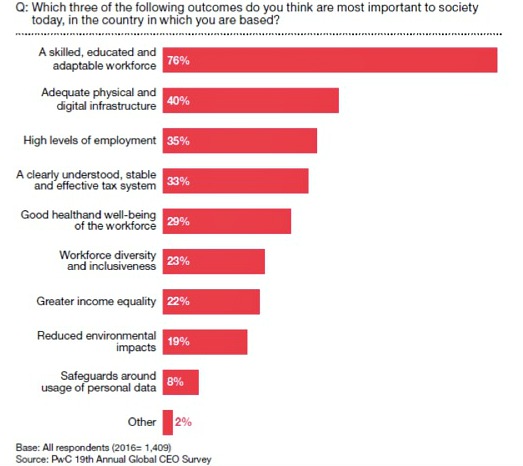
Each year, PwC’s Annual Global CEO Survey captures the issues at the top of the agenda for the world’s business community.
This year’s 19th Survey, presented to the World Economic Forum in Davos, certainly captured the mood of the uncertainties facing business: about half (49 percent) of the CEOs who responded to this year’s Survey believe that global economic growth will stay the same over the next 12 months, while those thinking it will improve has fallen to 27 percent.
Indeed, the CEOs surveyed generally appear to be increasingly concerned across the majority of potential threats (compared to previous years). Over-regulation remains the top concern for business while geopolitical uncertainty, exchange rate volatility, skills availability, fiscal deficits/debt and an increasing tax burden are also clouds on the horizon. Seven in ten or more of the CEOs surveyed are ‘somewhat’ or ‘extremely’ concerned about each of these issues.
In uncertain times, however, one of the keys to the resilience of an economy (national, regional or local) or an organisation is to have skilled people in the workforce. Indeed in the UK, we have found in our research with think tank Demos that the category of skills is the strongest driver of good growth (see Figure 1). Skilled workers tend to be more flexible, able to learn new skills and be entrepreneurial. And in uncertain conditions, and particularly in recession, these workers can adapt to a changing job market and drive new ventures to support recovery.
Figure 1: Drivers of good growth
And business agrees! In this year’s Survey, we asked CEOs which outcomes they thought are most important to society today. The answer was unequivocal: a skilled, educated and adaptable workforce (see Figure 2). And this outcome was the most important for CEOs across all regions and firm sizes.
Figure 2: Education, education, education!
But what is of equal interest to me is that three quarters of the CEOs we surveyed believed that it was a priority for business itself to help deliver a skilled, educated and adaptable workforce).
Of course, this is not to say that business sees itself as the primary provider. Indeed, just over half of the CEOs we surveyed (53 percent) put the outcome of a skilled, educated and adaptable workforce on their list of top priorities for government. And this rises to around three quarters (74 percent) of CEOs surveyed in the Middle East and is their top priority for government by a wide margin.
Acquiring the right skills is clearly an essential prerequisite to the desired outcomes for citizens (particularly new entrants to the labour force) of getting a job and earning a decent income. But another key issue is matching people to opportunities so that the right skills are in the right places. And here there is also much room for improvement, particularly for higher education institutions and business.
This is evident from the release of the results of AIESEC’s first YouthSpeak report on millennials worldwide, in partnership with PwC and with the support of the United Nations Millennium Campaign, MY World and United Nations Secretary-General’s Envoy on Youth. In this survey, 42,257 millennials voiced their opinions about education, employment and entrepreneurship. The report shows that millennials are increasingly worried about the widening gap between education and employment. In particular, they feel that universities are not connected to their future goals and employers do not engage with them in a meaningful way.
Worldwide, millennials say they are lacking the career guidance and support that would help them understand what they need for the ideal post-graduation career with university advisors ranking last in the report’s list of influencers to support career decisions.
But it is not just the educators who can bridge this gap. One of the most important conclusions from the YouthSpeak survey is that students and employers have a vital role to play too. As Gordon Ching, Global Vice President at AIESEC International, comments: “If we are to develop an effective education system that meets student needs, it will need greater integration of youth opinion and more employer input. These inputs are critical to ensuring that curriculums are aligned with external trends and utilizing teaching methods like experiential learning that can better engage young people.”
So what’s to be done? Education providers need to do more to take advantage of business engagement, maximising the opportunity for businesses and pupils/students to interact and smooth the transition from education to the world of work. Individuals also need to be empowered to make well-informed choices, with high quality, objective advice on potential career paths towards good jobs. And government must step in to improve the brokering process where there is most risk of a deficit of good quality information.
♣♣♣
Notes:
- This blog post is based on the report Government and the Global CEO: Redefining success in a changing world, PwC’s Public Sector Research Centre (February, 2016)
- This post gives the views of its authors, not the position of LSE Business Review or the London School of Economics.
- Featured image credit: CWCS Managed Hosting CC-BY-2.0
 Nick C. Jones is Global Director of PwC’s Public Sector Research Centre and sits on the Editorial Board for PwC’s Annual Global CEO Survey. He is also a member of PwC’s Global Thought Leadership Council and PwC’s UK Government & Public Sector Leadership Team. LinkedIn. Twitter:@Jones_NickC
Nick C. Jones is Global Director of PwC’s Public Sector Research Centre and sits on the Editorial Board for PwC’s Annual Global CEO Survey. He is also a member of PwC’s Global Thought Leadership Council and PwC’s UK Government & Public Sector Leadership Team. LinkedIn. Twitter:@Jones_NickC



